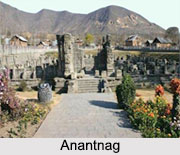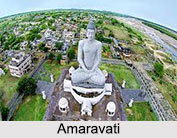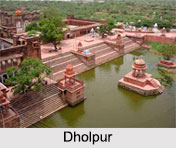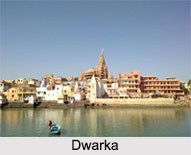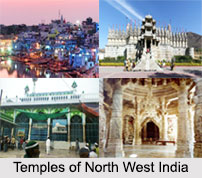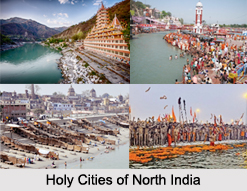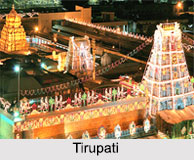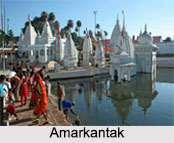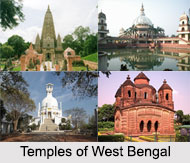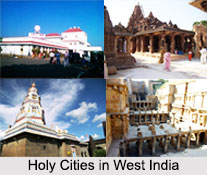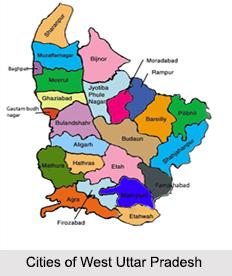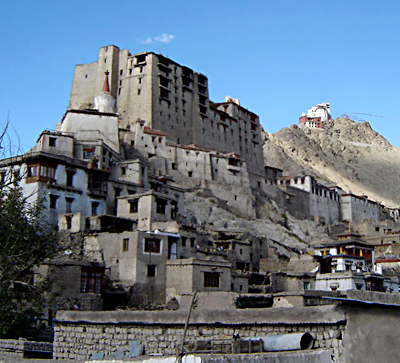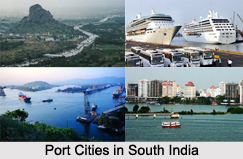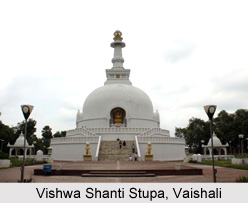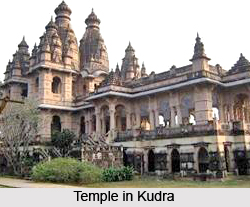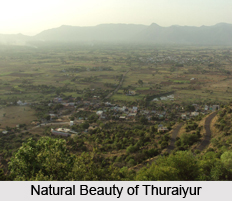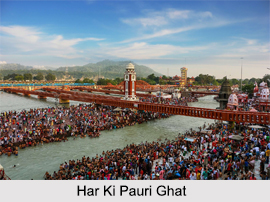Etymology of Madurai
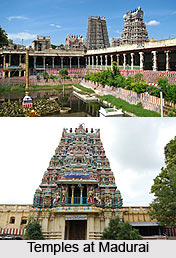 The city has various names like "Madurai", "Koodal", "Naanmadakoodal" and "Thirualavai". The word Madurai is derived from Madhura (sweetness) arising out of the divine nectar showered on the city by the Hindu god Shiva from his matted hair. In Tamil literature, Madurai is usually called `Nanmadakkoodal` meaning the junction of four towers, refers to the four major temples for which Madurai was known for. It is also called the Athens of the East. The term `Koodal` means assembly.
The city has various names like "Madurai", "Koodal", "Naanmadakoodal" and "Thirualavai". The word Madurai is derived from Madhura (sweetness) arising out of the divine nectar showered on the city by the Hindu god Shiva from his matted hair. In Tamil literature, Madurai is usually called `Nanmadakkoodal` meaning the junction of four towers, refers to the four major temples for which Madurai was known for. It is also called the Athens of the East. The term `Koodal` means assembly.
History of Madurai
Madurai has been inhabited since the 3rd century BC. The city is also mentioned in Kautilya`s "Arthashastra". It is known from the literary evidences that earlier Madurai was consumed by the sea. Later, in the 6th century B.C. the Pandya King Kulasekara established the second Madurai. The culture of Tamil Nadu is woven with the history of Madurai in all aspects such as history, religion, art, legend, learning and so on. As mostly the elites and learned men lived in the Madurai city, hence it was called the Athens of the East.
The Pandyas ruled Madurai from the Sangam Age. After the Sangam age, Tamil Nadu including Madurai came under the rule of the Kalabhra dynasty, which was ousted by the Pandyas. The Pandyas were ousted from Madurai by the Chola dynasty during the early 9th century. The Cholas ruled here for a short period till the Muslim invasion by Malik Kafur. Then, it was ruled by the Vijayanagar emperors and their governors, the Nayakas from 1378. Madurai became independent from Vijayanagar in 1559 under the Nayaks. The Nayakas ruled for more than 200 years and their reign was considered as the golden age. At that time, Madurai was at its height in art, architecture and learning. The Nayaka rulers decorated Madurai with temples and buildings. They also built the famous Meenakshi temple, which are landmarks of the city. In 1801, Madurai came under the direct control of the British East India Company.
Geography of Madurai
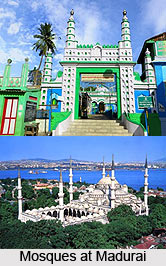 Madurai is located at an average elevation of 101m from the sea level. The city of Madurai lies on the flat and fertile plain of the Vaigai River, which runs in the northwest-southeast direction through the city, dividing it into two almost equal halves. The land in and around Madurai is utilized largely for agricultural activity, which is fostered by the Periyar Dam. Madurai lies southeast of the Western Ghats. Paddy is the major crop, followed by pulses, millet, oilseeds, cotton and sugarcane.
Madurai is located at an average elevation of 101m from the sea level. The city of Madurai lies on the flat and fertile plain of the Vaigai River, which runs in the northwest-southeast direction through the city, dividing it into two almost equal halves. The land in and around Madurai is utilized largely for agricultural activity, which is fostered by the Periyar Dam. Madurai lies southeast of the Western Ghats. Paddy is the major crop, followed by pulses, millet, oilseeds, cotton and sugarcane.
Climate of Madurai
Madurai is hot and dry for 8 months of the year. Cold winds are experienced during February-March and the hottest months are from March-July. The city experiences a moderate climate from August-October by heavy rain and thundershowers, and a slightly cooler climate from November-February. Fog and dew are rare, occurring only during the winter season. Being halfway from mountains and the sea, it experiences similar monsoon pattern with Northeast monsoon and Southwest monsoon, with the former providing more rain during October-December.
Demographics of Madurai
According to 2011 census, Madurai had a population of 1,017,865 with a sex-ratio of 999 females for every 1,000 males, much above the national average of 929. A total of 100,324 were under the age of 6. The average literacy of the city was 81.95%, compared to the national average of 72.99%.
Economy of Madurai
The paddy fields cultivated in the Vaigai delta across Madurai North, Melur, Nilakottai and Uthamapalayam are known as "double-crop paddy belts". Farmers in the district enhances their income with subsidiary occupations like dairy farming, poultry-farming, pottery, brick making, mat-weaving and carpentry. Madurai is famed for its jasmine plantations in the foothills of Kodaikanal Hills, called "Madurai Malli".
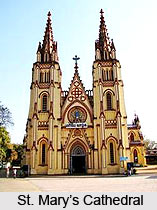
Madurai is one of the few rubber growing areas in South India. There are many rubber-based industries in Madurai. Automobile producers like General Motors, Ford, Toyota and Honda are the major consumers of machinery produced in the city. The city is home to one of the top motorcycle manufacturers in India, the TVS Group. There are numerous textile, granite and chemical industries operating in Madurai. Madurai is promoted as a second-tier city for IT.
Discover local businesses including manufacturers, suppliers, and dealers across industries in Madurai Yellowpages.
Religious Sites at Madurai
•Meenakshi Amman Temple is a historic Hindu temple located on the south side of River Vaigai in Madurai.
•Koodal Azhagar Temple is a Vishnu temple located in the city. It has idols of "Navagraham" (nine planet deities.
•Kazimar Big Mosque is the oldest Muslim place of worship in the city. The dargah called Madurai Maqbara, is located inside the mosque.
•Goripalayam Mosque is located in Goripalayam.
•St. Mary"s Cathedral is the place of the Roman Catholic Archbishop of Madurai.
Architecture of Madurai
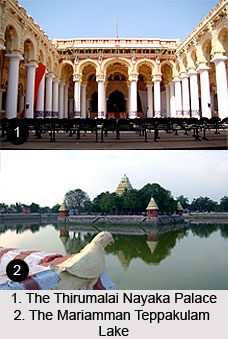 Madurai dates back to the 7th century B.C. when it was the capital of the Pandya dynasty. In the 14th century it came under the control of the Delhi Khilji dynasty and became a Muslim kingdom. Half a century later the Vijayanagar dynasty took it over and again turned it into a Hindu holy land. In 1565, the Nayak dynasty ruled the land till 1781. Thirumalanayaka was a very prominent Nayak and the Meenakshi Temple and the palace that is standing even now were built during this time.
Madurai dates back to the 7th century B.C. when it was the capital of the Pandya dynasty. In the 14th century it came under the control of the Delhi Khilji dynasty and became a Muslim kingdom. Half a century later the Vijayanagar dynasty took it over and again turned it into a Hindu holy land. In 1565, the Nayak dynasty ruled the land till 1781. Thirumalanayaka was a very prominent Nayak and the Meenakshi Temple and the palace that is standing even now were built during this time.
The Mariamman Teppakulam is a man made lake and incorporates the Hindu architectural style. It is a square tank as big as the temple precincts. In the middle of the lake is a square island with pavilions on the four corners and a vimana in the middle. The Meenakshi Sundareshwara temple is a Hindu temple and is noteworthy for its splendid architecture. There are twelve gopuras altogether along with the north, south, east and west gopura entrances. The south gopura is the tallest and is forty eight meters high. In front of the east gopura is the Puthumandapa. These were built by the Hindu Pandya kings. They are heavily engraved with sculptures. In the precincts are the two main shrines with a surrounding corridor, a tank of the golden lotus, a thousand pillared hali and many other mandapas and small shrines, the walls of which cannot be called either pillars or walls. The sculpted decorations on them look like the Vijayanagara style of the latter days. However, the style lacks a little in vitality and is overly sculpted, and what can be called the zenith of styles in India is reflected here. The gold-plated main shrines are small and the turrets tower over the horizon in typical Dravida style architecture.
The Thirumalai Nayaka palace was a huge structure but at present only a pillared hall and a dance hall surrounded by a courtyard remains. The style is a blend of Hindu, Islamic and European architecture and is completely different from the Meenakshi Temple. The temple portrays a marvelous depiction of architecture of Madurai.
Monuments of Madurai
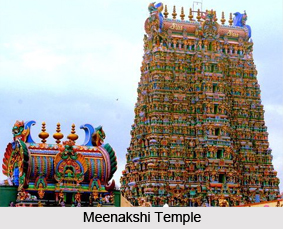 One of the most important monuments of Madurai is the Meenakshi Temple. In fact Madurai is often referred to as a temple city. Situated along the banks of the Vaigai river, it has long been a centre of pilgrimage and learning. It was home some 2000 years ago to the famous `Sangams` or the gatherings of poets and writers which is been the source of the remarkable Tamil literature. The Sangam rulers were the first to establish their supremacy over the region. The reigns then passed over to the Vijayanagara rulers and later the Nayakas. Though all were capable rulers, the rule of the Sangam rulers was the greatest era of development of Madurai in art and cultural heritage.
One of the most important monuments of Madurai is the Meenakshi Temple. In fact Madurai is often referred to as a temple city. Situated along the banks of the Vaigai river, it has long been a centre of pilgrimage and learning. It was home some 2000 years ago to the famous `Sangams` or the gatherings of poets and writers which is been the source of the remarkable Tamil literature. The Sangam rulers were the first to establish their supremacy over the region. The reigns then passed over to the Vijayanagara rulers and later the Nayakas. Though all were capable rulers, the rule of the Sangam rulers was the greatest era of development of Madurai in art and cultural heritage.
The temples, educational centres and monuments make Madurai the cradle of Indian cultural legacy. It is strewn with a number of monuments which are major tourist attractions.
Religious Monuments in Madurai
By far the greatest attraction of Madurai is the Meenakshi Sundareshwar Temple located here. It is dedicated to Lord Shiva, who is known here as Sudareshvara, and Goddess Parvati known as Meenakshi. The Temple was originally built by the Pandyas King Kulasekara. Later it was extensively worked on and renovated and added to by successive rulers.
The ancient city of Madurai supposedly was laid out in a lotus-like formation, with the temple at the center and streets and main thoroughfares layered one after the other concentrically, outward from the center. There are high walled enclosures in the temple complex the sanctums for Meenakshi and Sundareshvara are kept surrounded by other smaller shrines. There are twelve beautifully sculpted gopurams rising from solid granite bases. They are decorated with vividly painted figures of deities, mythical flowers and animals.
The temple remains open on all days and two festivals, Chitirai and Avanimoolam are celebrated with great ardor and enthusiasm.
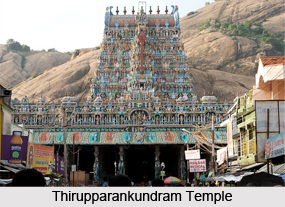 Thirupparankundram Temple is a rock cut Temple built by the Pandya rulers in the eighth century. It is located 7 kms southwest of Madurai.The sacred site is considered to be one of the six sacred abodes of Murugan.It is said to be the place where he married the daughter of Indra, Devyani. The beautifully carved temple is decorated with mandapas. During the months of March/April a fourteen day festival is conducted to celebrate the victory of murugan over the demon Suran.
Thirupparankundram Temple is a rock cut Temple built by the Pandya rulers in the eighth century. It is located 7 kms southwest of Madurai.The sacred site is considered to be one of the six sacred abodes of Murugan.It is said to be the place where he married the daughter of Indra, Devyani. The beautifully carved temple is decorated with mandapas. During the months of March/April a fourteen day festival is conducted to celebrate the victory of murugan over the demon Suran.
Kadal Alagar temple lies to the South West of the Meenakshi Temple and is dedicated to the Lord Vishnu. The temple contains three superimposed sanctuaries which contain Lord Vishnu. These are of gradually reducing size. It hoses Vishnu in sitting, standing and reclining positions. The outer wall has beautiful carvings and stone sculptures. The temple remains open on all days.
Alagar Koil temple is situated 12 kms north of Madurai. It is dedicated to the brother of Meenakshi, Kallagar, which is actually a form of Lord Vishnu. The small town is located at the foot of the Kalagar hills.
Anglican Cathedral can be found in the middle of the town in an open space south-west of the Great Temple of Meenakshi. It was designed by the Chennai architect Robert Fellows Chisolm and consecrated in 1881. It has been constructed in the Neo-Gothic architectural style of the British era. The church is a popular tourist attraction.
West of the main entrance to the People`s Park is the Jami Masjid, which contains two tombs: that of Ala-ud-Din Khilji and his brother Shams-ud-Din. A pillar inside is inscribed with the date 1574 and describes the sanctuary as the `Mosque of the Delhi Orukol Sultan`. The main feature of interest is the dome, cut from a single block of stone and measuring 6-7 m (22 ft) from base to apex and 21 m (69 ft) in diameter.
North of the Vaigai River are the tombs of the Madurai rulers. The sultans were buried to the North of the city. The complex of tombs includes the tomb of a local Sufi Saint, Bara Mastan Sada built in the sixteenth century, as well as Alauddin`s Mosque that has a prayer hall with a flat roof.
Historical Monuments in Madurai
Tirumalai Nayaka Palace lies to the south-cast of the Great Temple of Shree Meenakshi. This grand palace was built in 1636 by Tirumalai Nayaka. It has been constructed in the Indo-Saracenic architectural style and was originally four times as large as it is today. It was dismantled between 1662 and 1682 by Tirumala`s grandson in the transfer of the capital to Trichinopoly. Though it was partially restored in the 19th century by Lord Napier, Governor of Madras between 1866 and 1872, only a single section of the once superb complex today remains.
Today there are two oblong blocks remaining, constructed in Indo-Islamic style connected at one corner. The larger is built around a spacious open courtyard, which is surrounded by an elegant arcade. The columns are over 12-2 m (40 ft) high, enriched with foliated brick arches of finely chased chunam. Behind the arcade, three sides of the quadrangle have cloisters 43 feet wide, carved in triple rows of columns. Traces of the original turquoise, orange and red paint can still be seen on the capitals.
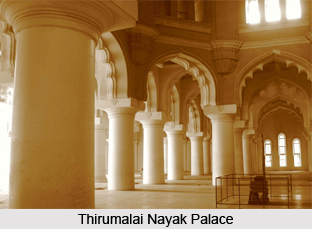 At the end of the courtyard the cloister deepens into a hall with five rows of massive pillars and three great domes .The main entrance portico was built to commemorate Lord Napier, the Governor of Madras from 1866 to 1872 who was responsible for its restoration.
At the end of the courtyard the cloister deepens into a hall with five rows of massive pillars and three great domes .The main entrance portico was built to commemorate Lord Napier, the Governor of Madras from 1866 to 1872 who was responsible for its restoration.
The Palace consisted mainly of two parts, the Swargavilasa and the Rangavilasa. This palace consisted mainly of two parts, namely Swargavilasa and Rangavilasa which house the royal residence, theatre, shrine, apartments, armory, palanquin place, royal bandstand, quarters, pond and gardens.
To the west and opposite the main entrance is the Celestial Pavilion or Swarga Vilasam, which was once the throne-room. It consists of an arcaded octagon, covered by a dome. It is evidence of the remarkable building skills of the engineers as it stands 20 ft high without any support.
There is another hall to the North of this which is high and lofty. It is covered by a pointed arched roof and reinforced with granite ribs which spring from a double series of arches, one above the other, carried on columns. In each corner is the carved figure of a warrior with a drawn sword. Above is a large gallery. Tradition asserts that this was Tirumala`s sleeping-apartment, with the bed suspended by chains from the ceiling.
A light and sound show is a major attraction for visitors and tourists. These are based on the lives of Tirumalai Nayak.
Madurai Maqbara
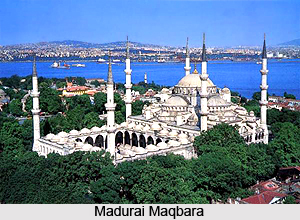 Madurai Maqbara is a group of three Dargahs, located in Madurai region of the Indian state Tamil Nadu, belonging to the Sufi saints namely Meer Ahmad Ibrahim, Meer Amjad Ibrahim and Abdus Salaam Ibrahim. Maqbara is an Arabic word which refers to mausoleum and is derived from the word `qabr` meaning grave. Dargah refers to the graves of those religious figures or Waliyullahs who devote their life to the cause of Islam and inspires other to follow the life preached by Prophet Muhammad.
Madurai Maqbara is a group of three Dargahs, located in Madurai region of the Indian state Tamil Nadu, belonging to the Sufi saints namely Meer Ahmad Ibrahim, Meer Amjad Ibrahim and Abdus Salaam Ibrahim. Maqbara is an Arabic word which refers to mausoleum and is derived from the word `qabr` meaning grave. Dargah refers to the graves of those religious figures or Waliyullahs who devote their life to the cause of Islam and inspires other to follow the life preached by Prophet Muhammad.
Meer Ahmadh Ibrahim (Periya Hazrat)
Meer Ahmadh Ibrahim, also known as Periya Hazrat, was born of a miracle. His father, Moulana Mir ni`amatullah, did not have a child for a long time after his marriage. Her wife once saw a dream in which Sultan Syed Ibrahim Shahid badusha of Erwadi asked her to visit Erwadi to have the blessings for a child. The couple acted accordingly and after 3 years they were blessed with a child. As a child Meer Ahmadh Ibrahim had left his home for education at madarasa. He was among the slow learners of his class and received scolding from his teacher for being a poor learner. His teacher had also insisted him to leave the madarasa for being unfit for education. However his life changed following a prayer to Allah and a dream and he successfully completed his education afterwards. After returning to his hometown Madurai, he began a madarasa to impart education to the Muslims all over Tamil Nadu. For his extraordinary wisdom he was appointed by the then Nawab of Carnatic in India as the government chief Kazi of Madurai and Kaziul Kuzaat. He was known for serving his job excellently. He died at the age of 63 in the year 1872.
Meer Amjad Ibrahim (Chinna Hazrat)
Meer Amjad Ibrahim, also called as Chinna Hazrat, was a God fearing person right from his childhood. From the beginning he was along with Periya Hazrat, his brother, for spreading Islamic education among the students of the southern part of Tamil Nadu. The nearby locality had a plethora of followers of these hazrats. Chinna Hazrat regularly visited these places for imparting education. He died at the age of 95 and was survived by his only son Saalim Hazrat and a daughter who was the wife of Moulana Syed Khaja Mueenuddeen saheb.
Abdus Salaam Ibrahim (Saalim Hazrat)
Abdus Salaam Ibrahim, also recognized as Saalim Hazrat, was the elder son of Chinna Hazrat whose birth marks a miracle. He was born very tiny and was half the size of a sparrow. Although the physicians predicted that he would not live, he grew gigantic to their astonishment. Right from his childhood, he was a God fearing person and dedicated his life to Islam. He grew up in an Islamic environment and was a Waliyullah right from his birth. Just as his grandfather, Hazrat Mir Niamatullah, Abdus Salaam Ibrahim did not have a child for a considerable time after his marriage. For this he had begged a lot from Erwadi Sulthan Syed Ibrahim Shaheed`s blessings for a child. Consequently he was blessed with two children after about 12 years, namely Syed Amjad Ibrahim and Syed Muhammad Shamsuddin Ibrahim. However the latter died in childhood.
Maqbara Hazrats and Fassiyatush Shadhiliyya
Periya Hazrat had accepted Tariqa (an order of Sufism, also known as Fassiyatush Shadhiliyyah, corresponding to mystical teaching and spiritual practices for attaining the ultimate truth) by being its Khalifatul Khulafa as per the appointment of Imama Fassi. He flourished the practises greatly. His brother Chinna Hazrat became the Khalifa of Fassiyatush Shadhiliyyah after his demise. Shamsuddin Muhammad Al Makki Al Fassi had appointed him. Saalim Hazrat however accepted the Tariqa after the Prophet gave him the consent. During the period of these three Sufi saints Fassiyatush Shadhiliyya Sufi order attained glory in the region of Tamil Nadu.
Heritage of Madurai
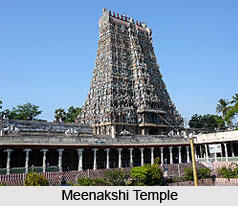 Madurai is also well known for its biggest and renowned Meenakshi Sundareswarar temple. It is one of the oldest heritages of the city. Madurai and its nearby areas are very rich in prehistoric material. These include a large number of natural caves on isolated hills where prehistoric man lived.
Madurai is also well known for its biggest and renowned Meenakshi Sundareswarar temple. It is one of the oldest heritages of the city. Madurai and its nearby areas are very rich in prehistoric material. These include a large number of natural caves on isolated hills where prehistoric man lived.
During the ancient period, Madurai city was also known as `Koodal`. It was the capital of the Pandyan kings from the Sangam age onwards. The ancient Greeks and Romans were well acknowledged about the city. The elaborate detail of the Pandyan kingdom at Madurai was provided by Megasthenes, the Greek ambassador at the court of Chandragupta Maurya (320 B.C.). Along with Hinduism, Madurai was also a stronghold of Jainism. It can be traced from the ancient inscriptions of the Brahmi script. It is known that several Jaina monks inhabited this area.
Another old heritage of Madurai is the Koodal Alagar temple, situated in the heart of the city. It was a favourite of Vaishnavites as it was one of the one hundred and eight Divya Desams praised by the Vaishnava saints or Alvars. One more heritage centre of Madurai is the Alagar Koil, another important Divya Desam. Anaimalai and Tirupparankunram, both situated on the outskirts of Madurai have cave temples belonging to the Pandyan age of the 8th century A.D.
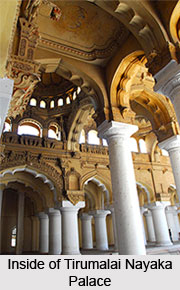 The Meenakshi temple of Madurai got its present form during the later-Pandyan age of the 13th century A.D. And more was added subsequently during the age of the Nayaka kings who ruled from this city from the 16th century A.D. The pompous `gopurams` at the entrance of the temple complex are built with startling features and attracts many visitors. These were constructed by the later Pandyan and Nayaka rulers. This heritage temple has the `Potramarai Kulam` (tank of golden lotuses) and the gold-plated `vimanas` of the shrines of Meenakshi and Sundareswarar within its premise. There are also several mandapas in the temple, which have carved pillars as well as the paintings on the ceilings painted with vegetable dye, mostly belonging to the Nayaka age.
The Meenakshi temple of Madurai got its present form during the later-Pandyan age of the 13th century A.D. And more was added subsequently during the age of the Nayaka kings who ruled from this city from the 16th century A.D. The pompous `gopurams` at the entrance of the temple complex are built with startling features and attracts many visitors. These were constructed by the later Pandyan and Nayaka rulers. This heritage temple has the `Potramarai Kulam` (tank of golden lotuses) and the gold-plated `vimanas` of the shrines of Meenakshi and Sundareswarar within its premise. There are also several mandapas in the temple, which have carved pillars as well as the paintings on the ceilings painted with vegetable dye, mostly belonging to the Nayaka age.
In the Madurai city, lots of festivals are celebrated throughout the year. The most important festival among them is the marriage of Goddess Meenakshi and Lord Sundareswarar celebrated in the month of Chittirai (April-May).
The Tirumalai Nayaka of the 17th century A.D. constructed many monuments in Madurai and the most important among them is his palace called Tirumala Nayaka`s palace. But unfortunately, his successor named Chokka-natha Nayaka broke this palace into pieces and removed to Tiruchirapalli for erecting another palace there. Now, only the surrounding court known as the `Swarga Vilasam` or audience hall can be seen. It is a huge pavilion, which is 235 feet in length and is105 feet in breadth with a big dome measuring 60 feet supported by twelve columns.
There are also few other heritages of Madurai like the `Tamukkam`, the arched palace of Rani Mangammal of 17th century AD. It is situated across the Vagai River and is supported by great pillars. It was used as a courthouse and collector`s office during the British period and was later used to house the Gandhi and Government museums.
Temples in Madurai
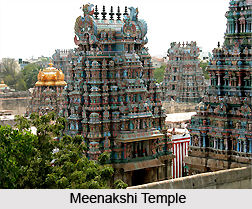 Times have changed but the temple city of Madurai has retained the essentials of culture of yore. The history of Madurai dates back to the 6th century BC. It was the capital of the Pandyan Empire till the 14th century. It was also the seat of Tamil learning. The last of the three Tamil Sangams (Academies) flourished here nearly 2,000 years ago. Madurai can easily be termed as the temple city of Tamil Nadu. Madurai is one of the 51 Shakti Peethas and the temple is the seat of `Bhudha.`
Times have changed but the temple city of Madurai has retained the essentials of culture of yore. The history of Madurai dates back to the 6th century BC. It was the capital of the Pandyan Empire till the 14th century. It was also the seat of Tamil learning. The last of the three Tamil Sangams (Academies) flourished here nearly 2,000 years ago. Madurai can easily be termed as the temple city of Tamil Nadu. Madurai is one of the 51 Shakti Peethas and the temple is the seat of `Bhudha.`
To reach Madurai one can avail the flights, railways or the roadways. It is accessible from Chennai (460 km), Kanniyakumari (245 km), Bangalore (435 km), Hyderabad (995 km) and other cities.
Tourists can start with the Madurai Temple. Pandya rulers lavished their skill and resources on the architecture of this shrine. It is a twin temple dedicated to Sundareswarar and His consort Meenakshi. There are 11 gopurams, the most attractive of them being the one at the southern entrance rising to a height of 160 feet with a parabolic curve. The Golden Lotus Tank inside the temple is surrounded by spacious corridors. Its walls are further covered with paintings depicting the Lord`s miracles. Adjacent to the tank are the Unjal Mandapam and the Kilikoottu Mandapam. The long rows of pillars here contain delicately-carved figures.
There is a special Peetam in a six-pillared mandapam where the coronation of all Nayak kings took place. The coronation of Meenakshi is also performed on this Peetam every year during the Chitrai festival. Goddess Meenakshi is believed to have been born as the daughter of a Pandya King and Siva as Sundareswarar, married her.
There are two temples within this compound
Meenakshi shrine: In the sanctum, the Goddess stands with a parrot and bouquet, radiating love and compassion. Meenakshi is conceived as Mother in Her loving mood.
Sundareswarar shrine: A large image of Ganesha greets the pilgrims as they proceed to the Sundareswarar temple. In front of the shrine is the famous Kampathadi Mandapam. This contains many finely sculptured pillars, including one depicting the wedding of Meenakshi. The beautiful figures of Lord Shiva, incarnations of Vishnu and other statues are striking illustrations of excellence of Dravidian art.
The Hall of Thousand Pillars is magnificently sculptured. In the Velliambalam, Lord Nataraja is seen in the dancing pose with His right foot raised. Usually Nataraja is depicted as dancing with His left foot raised. It is believed that here He did so in order to please His devotee, King Raja Sekhara Pandya. The dance is known as Gnanasundara Thandavam.
The main wonder of this temple is that the 985 pillars appear in a straight line from whichever angle one looks at them. An exhibition of many antiques, idols and interesting pieces of art is arranged here.
The Vasanta Mandapam, where the deities are placed during festivals, contains rare stone images. The Nayak rulers have been immortalized in brilliant statues.
Festivals in the Temples: Madurai is a city of festivals. The most important festival is the Meenakshi-Sundareswarar wedding on Chitra Poornima day. it is usually held in either April or May. The 64 Leelas of the Lord are commemorated round the year during different festivals. The illuminated Float Festival on Thai Poosam day (Jan-Feb) attracts a large number of pilgrims.
Tiru Aalavaai Temple in Madurai
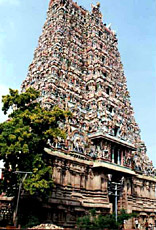 The Tiru Aalavaai temple is one of the greatest Shiva temples in India. It is vast and has many sculptures, halls, pillars and lofty towers. It is the site of the 64 Tiruvilayadalgal of Shiva (Tiruvilayadal puranam and Halasyamahatmiyam) and is one of the 5 Pancha Sabhais of Nataraja - Rajata (Velli )Sabhai - where Shiva dances with a raised a foot.
History: The original temple was razed to the ground by invaders and the current structure was built by the Nayak Rulers.
The Tiru Aalavaai temple is one of the greatest Shiva temples in India. It is vast and has many sculptures, halls, pillars and lofty towers. It is the site of the 64 Tiruvilayadalgal of Shiva (Tiruvilayadal puranam and Halasyamahatmiyam) and is one of the 5 Pancha Sabhais of Nataraja - Rajata (Velli )Sabhai - where Shiva dances with a raised a foot.
History: The original temple was razed to the ground by invaders and the current structure was built by the Nayak Rulers.
Legends: Shiva is said to have been worshipped by Indra in the Kadambavana forest and hence Sundareswarar`s vimanam is known as Indra Vimanam. Legend has it that Meenakshi (Parvati) the daughter of Malayadwaja Pandyan married Shiva here. Together, Shiva (Soundara Pandyan) and Meenakshi are said to have ruled over Madurai. There are several such legends surrounding this temple.
Festivals: For Chittirai Tiruvizha (Apr 15-May 15) the city takes on a festive look; colorful processions; the divine marriage and the coronation are reenacted. The float festival is of great importance
Rani Mangamma of Madurai
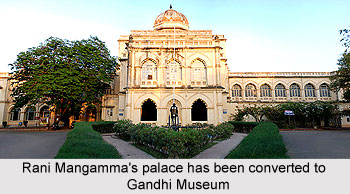 Famous for developing infrastructure, Rani Mangamma was the queen of Chokkanatha Nayaka (1659-82) of Madurai. She ruled as the regent when her grandson Vijayaranga Chokkanatha was crowned when he was barely three months old. Her son Ranga Krishna Virappa Nayaka died in 1689 after a short rule. His wife Muttamma committed suicide after the birth of her son Vijayaranga Chokkanatha.
Famous for developing infrastructure, Rani Mangamma was the queen of Chokkanatha Nayaka (1659-82) of Madurai. She ruled as the regent when her grandson Vijayaranga Chokkanatha was crowned when he was barely three months old. Her son Ranga Krishna Virappa Nayaka died in 1689 after a short rule. His wife Muttamma committed suicide after the birth of her son Vijayaranga Chokkanatha.
The tact and diplomacy of Mangammal helped in maintaining amicable relations with the neighbouring powers. She bought off the Muslims and was subordinate and loyal to them. She also bribed the Marathas. Mangamma successfully resisted the aggressive policy of Chikkadevaraya of Mysore. She undertook an expedition to Travancore to collect arrears of tribute. Her war with Tanjavur ended in peace and an alliance. In Ramnad, Kilavan Setupati was becoming more and more independent. In about 1698 A.D. he besieged Madurai city and took it but was soon driven out. In 1702 A.D. he became completely independent.
Mangamma showed great lenience towards Christian preachers and her Christian subjects. She was equally considerate towards other religions. A copper plate inscription of 1692 records a grant for the maintenance of a mosque in the name of her grandson. In 1701 she financed for the construction of a Muhammadan dargah as a gift to some villages near Tiru-chirapalli.
Mangamma has favoured many Hindus. Her liberality regarding charities and public works is proverbial. She is famous as a road maker. She built some artistic public edifices like summer house and the choultry, which is named after her prestigious name. She provided for the comfort of pedestrians by planting trees on the roads she constructed and repaired, and placing inns and supplies of water on the way. She made grants for providing village settlements for brahmanas called agraharas. An inscription of 1701 records a grant of land for a feeding institute. She paid attention to irrigation, as is indicated by her inscriptions on the bank of the Uyyakondan channel in 1687 and 1704. She is said to have met with a tragic death in 1706 A.D.
Madurai Airport
Madurai Airport is situated at Madurai in Tamil Nadu, India. It is a public airport serving only domestic purposes. The airport is situated at a distance of 13 kilometres from the Madurai railway station. The airport is well connected with cities like Bangalore, Chennai, and Mumbai. The airport authority has propounded to made the airport an international one. According to K. Ramalingam, Regional Executive Director (Southern Region), "Airports Authority of India had gone on record that except immigration facilities, all other infrastructure was available at the Madurai airport and, if required, officials could be diverted from Tiruchi and Thiruvananthapuram". But he made it clear that the call for for upgradation should come up from the airlines.
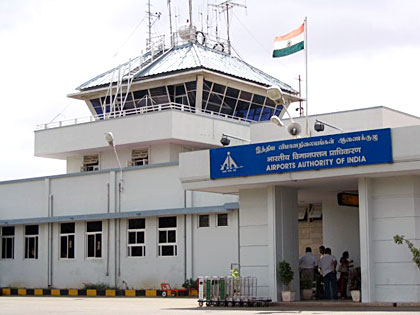 According to CII, if the airport becomes international, air traffic will drastically increase. They have also projected a growth in the international and domestic cargo movement. The present situation is such that passengers from southern districts have to reach Chennai, Tiruchi or Thiruvananthapuram to take international flights. Air Deccan (Bangalore, Chennai); Indian (Chennai, Mumbai); Jet Airways (Chennai) and Paramount Airways (Chennai) are the only airlines operating from Madurai Airport.
According to CII, if the airport becomes international, air traffic will drastically increase. They have also projected a growth in the international and domestic cargo movement. The present situation is such that passengers from southern districts have to reach Chennai, Tiruchi or Thiruvananthapuram to take international flights. Air Deccan (Bangalore, Chennai); Indian (Chennai, Mumbai); Jet Airways (Chennai) and Paramount Airways (Chennai) are the only airlines operating from Madurai Airport.
The Madurai Airport has also undertaken a series of development and expansion projects that will cost Rs. 150 crore. The project involves the launch of Madurai`s own airline, Paramount Airways, and mega projects lined up for southern districts, pointing towards upgradation of the airport.
Extension and rennovation process on the upgradation of Madurai Airport is in progress. The upgradation process has been planned phase-wise. At present the airport has two parking bases. Runway of the Madurai Airport is 6,000-ft long and the arrival and departure capacity of the terminal building is 50 passengers each. Expansion of the runway from 6,000 ft to 7,500 ft, creation of an isolated base and five parking bases are the works included in Phase-I. Phase-I will cost around Rs 22 crore. This phase of work was started in the end of 2005 and forty per cent of the work on phase-I is complete. Contract of Phase-I was awarded to PNCRDS, an Agra-based consortium. Construction of a Rs 2-crore fire station work within the airport premises is in progress.
Phase-II expansion work of the terminal building will be taken up soon. Madurai Airport is considered one of the 35 non-metro airports under upgradation. The airport has nominated UTI Bank and Vienna Airport syndicates to study the viability of city side development to earn non-aeronautical revenue.
Visiting Places in Madurai
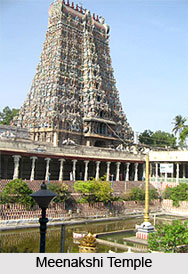 Madurai is one of the oldest cities of the Indian state of Tamil Nadu. It was ruled by different Empires. There are various beautiful places around the Madurai city. Some of them are given here:
Madurai is one of the oldest cities of the Indian state of Tamil Nadu. It was ruled by different Empires. There are various beautiful places around the Madurai city. Some of them are given here:
Meenakshi Temple in Madurai
This temple is situated in the midst of the Madurai city. The Meenakshi temple is an important landmark and nucleus of the life of the city. There are 11 gopurams in this temple and the tallest of them is at the southern portal rising to a height of 200 ft. This portion is completely dedicated to Goddess Meenakshi. The entrance of the temple is from Vittavasal Street. It is adorned by the Ashtalakshmi i, e, eight forms of Goddess Lakshmi Mandapam.
On the temple ceiling, the scenes of Kumara Sambhava and the marriage of Goddess Meenakshi with Sundareswara are painted. The statues of Subramanya and Vinayaka can be seen at the entrance. The passage is the beautiful sculpture of Siva and Meenakshi as a huntress. The mandapam has thousand pillars and it is a real museum of Dravidian art and architecture. The Ardhanari idol carved by Thirumalai Nayak can also be seen here. The sculptures of Lord Nataraja can be seen here in a different style instead of raising his left leg up, he plays it vice versa. The dancing hall here is called Velliambalam and the idol is plated with silver.
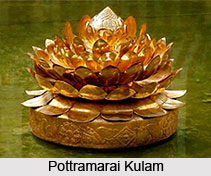 The Temple Museum of Madurai
The Temple Museum of Madurai
This museum can be seen in the 1000 pillared mandapam. There are 985 richly carved pillars in the temple museum and each one of them is different from the other. The Vasantha Mandapam or Pudumandapam of this temple museum of Madurai has more scenes of the wedding ceremony. The spring festival is held here in April-May.
Oonjal Mandapam of Madurai
This mandapam is situated on the western end of the tank called Pottramarai Kulam. There is a swing here on which Goddess Meenakshi and Her consort Lord Siva are seated and worshipped every Friday.
The Kilikoottu Mandapam or hall of parrots can be seen near to it. There are beautiful sculptures with caged parrots can be found here that chant the name of Meenakshi.
There are total 12 gopurams of this mandapam. The tallest four among them stand at the outer walls. The southern gopuram is the tallest of them and is the most impressive and has over 1500 sculptures. The panoramic view of the city can be seen from its top.
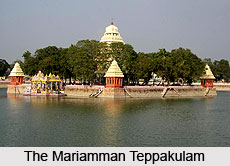 There are eight smaller gopurams within the compounds of the twin temples. It is so huge that new visitors may lose their way. Therefore, it is better to go with a guide or with a person who had already been there several times.
There are eight smaller gopurams within the compounds of the twin temples. It is so huge that new visitors may lose their way. Therefore, it is better to go with a guide or with a person who had already been there several times.
The Mariamman Teppakulam of Madurai
This is a tank, which is also known as Vandiyur Teppakulam. It is about 5 kms east of Meenakshi temple. It covers an area equal to the twin-temple complex. Thirumalai Nayakar built this tank. There is an island in the middle and also a temple for Ganesa. The tank was constructed due to digging of earth to make bricks for the Thirumalai Nayak palace. This tank is 1000 ft long and 950 ft wide and four white turrets border the garden of the island. In this tank, the float festival of the Meenakshi Amman temple is held in January-February.
The Thirumalai Nayak Mahal of Madurai
This is a palace of Thirumalai Nayak, which is situated just a km away from the temple. This is an Indo-Saracenic architecture, which was constructed in 1523A.D. The granite pillars of it are cased with mortar and the supporting arches present a majestic view. There are towers in the corner of the east face.
The Swarga Vilasam or the audience hall is the most significant part of this structure. The dome of it is 60 ft in diameter and 70 ft in height. This high dome stands firm without any support, which shows the engineering skill of its builders. The zenana surrounds the dome from where the royal ladies used to view the durbar. The fine architectural style of the Nayakas is represented by it.
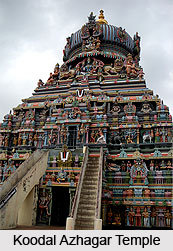 The tourists can visit there from 9 a.m. to 1 p.m. and from 2 p.m. to 5 p.m by paying a minimum entrance fee of Rs.l. Everyday, the sound and light shows on the life of Thirumalai Nayak and the story of Silappathikaram is organised here at 06.45pm.
The tourists can visit there from 9 a.m. to 1 p.m. and from 2 p.m. to 5 p.m by paying a minimum entrance fee of Rs.l. Everyday, the sound and light shows on the life of Thirumalai Nayak and the story of Silappathikaram is organised here at 06.45pm.
Koodal Azhagar Temple of Madurai
In Madurai, Lord Vishnu is known as Koodal Azhagar and this is one of the Vishnu temples of the city. Here, no tall gopurams can be found and the Vimana is called `Ashtanga`. It stands in the centre with diminishing tiers under which the sanctum lies. The base of this temple has excellent carvings.
The Tamakam of Madurai
It is a beautiful remnant of Thirumalai Nayak. It looks like his Palace, the Mahal. The Lotus Hall here has a dome with ceiling, shaped like an inverted lotus. The Nayaka`s used it as their summer palace.
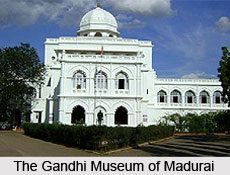 Goripalayam Mosque of Madurai
Goripalayam Mosque of Madurai
There is a large mosque in Goripalayam containing two tombs of two Delhi Sultans of the Madurai sultanate. Here, the dome is 70 ft. in diameter and 20 ft. in height. But, the strange fact is that it was made of a single block of stone. It is said that Thirumalai Nayak built this for his Muslim subjects.
The Gandhi Museum of Madurai
This museum contains a picture gallery, a gallery of relics, a Khadi and Village Industries section and a South Indian handicrafts section. It is situated in an old palace.
Madurai Kamaraj University
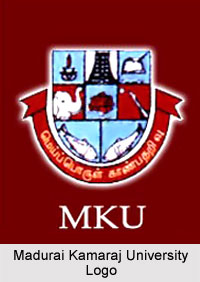 Madurai Kamaraj University was inaugurated on 6 February 1966, based on the extension centre of the University of Madras, located at Madurai. In 1968 the foundation stone for a new campus was laid by Zakir Hussain, the President of India. The Directorate of Distance Education of the university was established in 1971. In 1978 the name of the university was changed to Madurai Kamaraj University to honour the K. Kamaraj, former Chief Minister of Madras State. It has 18 schools comprising 72 departments and 109 affiliated colleges
Madurai Kamaraj University was inaugurated on 6 February 1966, based on the extension centre of the University of Madras, located at Madurai. In 1968 the foundation stone for a new campus was laid by Zakir Hussain, the President of India. The Directorate of Distance Education of the university was established in 1971. In 1978 the name of the university was changed to Madurai Kamaraj University to honour the K. Kamaraj, former Chief Minister of Madras State. It has 18 schools comprising 72 departments and 109 affiliated colleges
